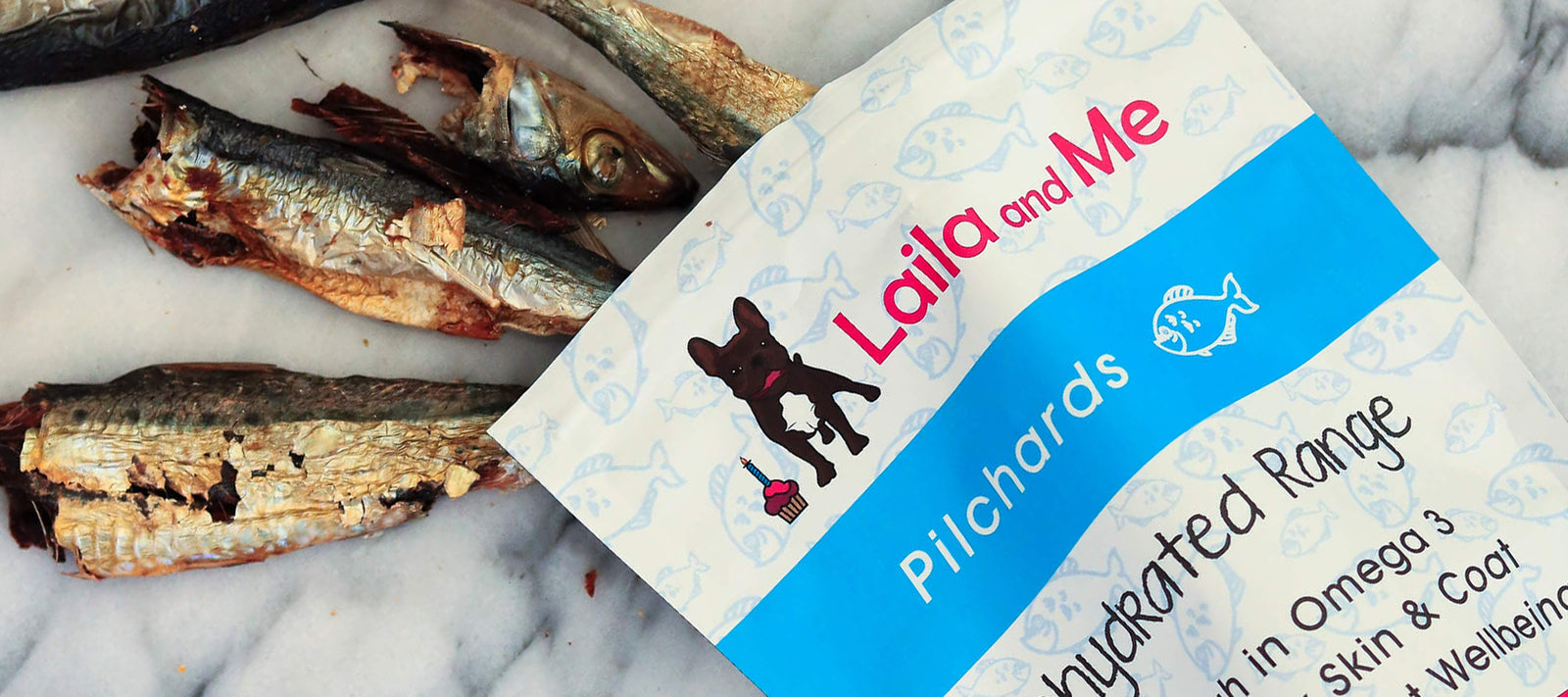TREATS
WELLBEING
Can my dog eat Sardines?
October 09, 2021 3 min read

Are Sardines good for pets?
Sardines are rich in vitamins and minerals. A small serving of sardines once a day can provide up to 13% of the RDA (recommended daily allowance) value of vitamin B2; roughly one-quarter of the RDA of niacin, and about 150% of the RDA of vitamin B12. All B vitamins help to support proper nervous system function and are used for energy metabolism, or converting food into energy. Also, sardines are high in the major minerals such as phosphorus, calcium, potassium, and some trace minerals such as iron and selenium. Sardines are also a natural source of marine omega-3 fatty acids, which reduce the occurrence of cardiovascular disease, Recent studies suggest the regular consumption of omega-3 fatty acids reduces the likelihood of developing Alzheimer's disease and can even boost brain function. These fatty acids may also help lower blood sugar levels a small amount. They are also a good source of vitamin D, calcium, and protein.
Because they are low in the food chain, sardines are very low in contaminants, such as mercury, relative to other fish commonly eaten by humans.
👉🏼 Shop Laila and Me Pilchards online

Sardines are a Low Fat Pet Treat
Whole pilchards are very high in protein and low in fat. They are an excellent source of high-quality proteins with sufficient amount of all the essential amino acids. Fats in fish are less saturated and the most prominent fats in fish are Omega-3 fatty acids. Fish oil is also one of the few natural food sources of vitamin D. Vitamins include A, B2, B3 & B5 and D.
What vitamins are in sardines?
Vitamin A: Is important for growth and development, for the maintenance of the immune system and good vision.
B Vitamins: Are important for growth, reproduction, immunity, hair growth, regulation of food intake, blood cells, neurological function, eye structure, cardiac function, skin structure and function.
Vitamin D: By balancing the body’s levels of calcium and phosphate, this vitamin helps the formation of healthy bones and teeth. A deficiency of Vitamin D can cause rickets.
Source: Food Nutrition Table and WH Foods
Are Sardines High in Protein?
Sardines are rich in numerous nutrients that have been found to support cardiovascular health. They are one of the most concentrated sources of the omega-3 fatty acids EPA and DHA, which have been found to lower triglycerides and cholesterol levels; one serving (3.25 ounce can) of sardines actually contains over 50% of the daily value for these important nutrients. Sardines are an excellent source of vitamin B12, ranking as one of the World's Healthiest Food most concentrated in this nutrient. Vitamin B12 promotes cardiovascular well-being since it is intricately tied to keeping levels of homocysteine in balance; homocysteine can damage artery walls, with elevated levels being a risk factor for atherosclerosis.
Sardines are not only a rich source of bone-building vitamin D, a nutrient not so readily available in the diet and one that is most often associated with fortified dairy products. Vitamin D plays an essential role in bone health since it helps to increase the absorption of calcium. Sardines are also a very good source of phosphorus, a mineral that is important to strengthening the bone matrix. Additionally, as high levels of homocysteine are related to osteoporosis, sardines' vitamin B12 rounds out their repertoire of nutrients that support bone health.
Source: Food Facts
👉🏼 Shop Laila and Me Pilchards online

What benefits do Sardines have for pets?
- May reduce your risk of heart disease – According to studies, the omega-3s in sardines can help break down bad LDL cholesterol, which can then maintain optimal heart health.
- Helps prevent blood clots - Omega-3s break down arterial plaque and help control blood pressure levels.
- Maintain eye health - Consuming oily fish like sardines has been found to reduce the risk of age- related macular degeneration (AMD), a condition that commonly occurs in people ages 50 and older.
- Can give the immune system a boost and fight free radicals - Studies found that fish oil made from sardines helped improve immune system health by increasing the number of immune cells. The selenium in sardines can help neutralize free radicals and protect organs from damage.
Source: My Fitness Pal and Takamas
👉🏼 Shop Laila and Me Pilchards online
Over to you
Do you have any more questions based around Sardines/Pilchards for Pets? Pop them below and we will answer them
Leave a comment
Comments will be approved before showing up.

